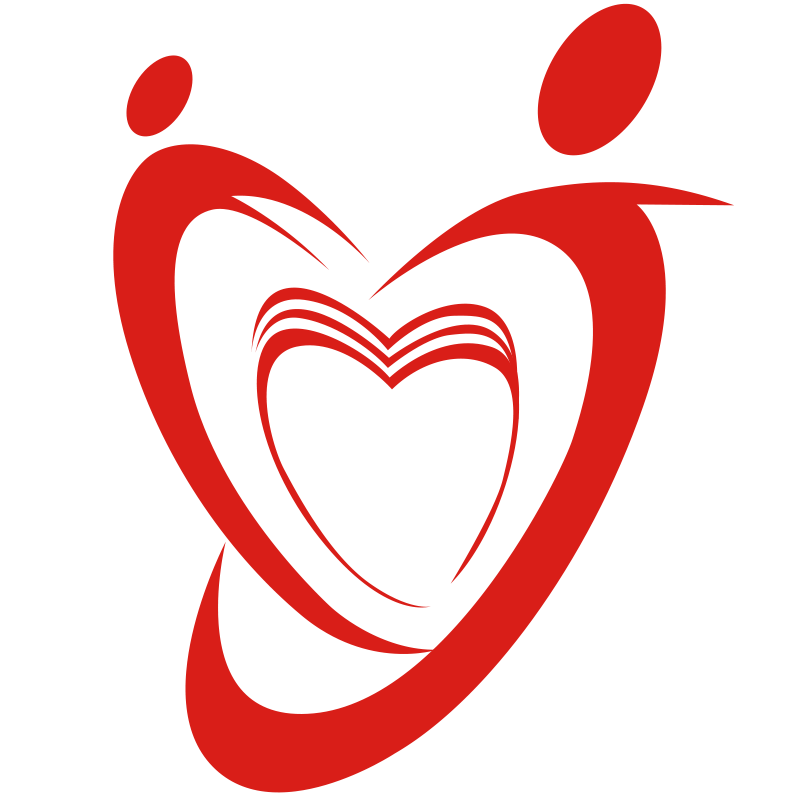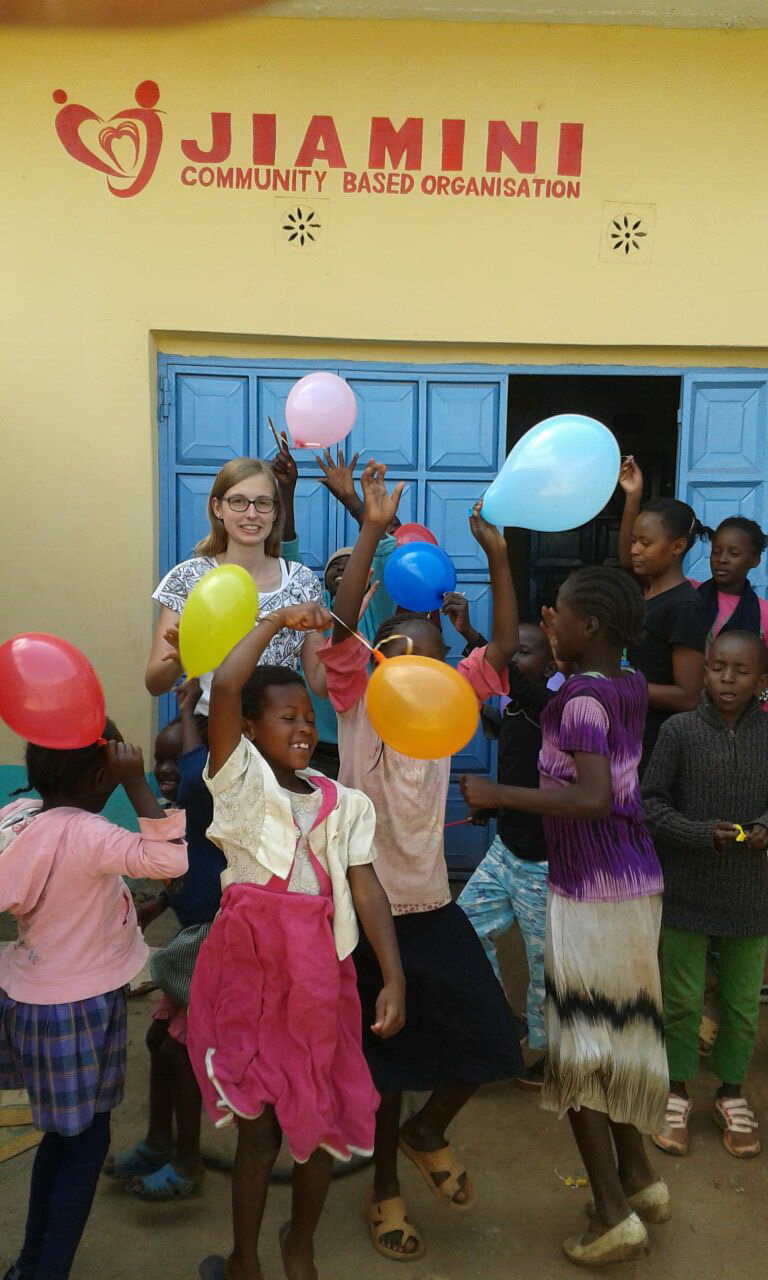From August 17th to September 7th, Theresia was on site in Kenya to support the Jiamini day center as a volunteer. If you want to know more about your experiences and impressions, you can now read through your final report. Have fun while reading:
Arrival
I set foot on Kenyan soil for the first time on a Thursday evening in August. At the airport in Nairobi I was met by the Jiamini manager and a driver then took us to the host family in Thika (approx. 1 hour from Nairobi). During the trip, the manager told me something about my host family and his work at Jiamini. He showed me pictures of the children, which gave me a first look at them. Because of the heavy traffic, it was a long drive that seemed infinitely long to me. Probably because I was so excited to see where I would live in the next 3 weeks. But the interesting stories told by the Jiamini manager made the ride fun and enjoyable. When I finally arrived at the host family, I was warmly welcomed.
Host family and surroundings
I was staying with the family of the Jiamini Finance Director. He lives with his wife and 2 children (girl and boy) in Landless, a suburb of Thika (approx. 10 km from the city center). Here they live in a small house with a garden, chickens, cats and a dog. The area is remote and the neighborhood is relatively uninhabited and sprawling. The roads are poorly developed and uneven, the paved main road is approx. 3 km away. The nearest supermarket is also located here. The host family has running water but no shower as we know them from Germany. You wash yourself with cold water from a bowl. For us Europeans a different way of showering, but with boiled water you can quickly get used to the new shower.
I was well looked after in the host family, especially with delicious food because cooking was the host mother's great passion. I loved their food, especially the Kenyan specialties chapati and mandazi. She always filled my plate to the brim because Kenyans eat large portions and that late in the evening. Rice, beans and African tea are particularly popular. This is made from tea leaves with milk and is the drink par excellence in Kenya, which is drunk all day long. Drinking water is not common here, which is why I bought this in the supermarket. The family was very nice and hospitable. I felt very comfortable there and in good hands. So that I always get home safely, they have hired a motorcyclist friend for me to drive home. I could call him at any time and he was there within a few minutes. Once when I wasn't home when it got dark, the host mother called me to ask where I was and whether everything was okay. She was worried - a very loving and caring way.
Life in Kenya
The clocks tick differently in Kenya than in Germany. You don't take your watch so precisely here and you take a lot of time. If it is said that the departure will be in 2 minutes, it can turn into half an hour. But that's no wonder if you clean the car comfortably in the morning and take a shower 5 minutes before departure. Then there can be time delays - that's just how it is with "Kenyan Time". You have to have a lot of patience and flexibility.
The center of Thika is always very busy. Street vendors line up on the sidewalks. Together with the many means of transport Matatu (mini bus), Boda-boda (motorcycle taxi) and Tuk-Tuk (auto rickshaw), there is always a lot of activity. The streets are often overcrowded and with the loud horns of the matatus the traffic looks chaotic. The Matatu is a shared taxi and the most widely used means of transport. Accordingly, it is always packed. When it is overcrowded, you sit squeezed in and are shaken vigorously on the bumpy roads. Due to the constant getting in and out of people, it can sometimes take a little longer to get to your destination. But the trip is a little adventure and very cheap. In general, people in Kenya pay relatively little for food and public transport compared to Germany.
Since Thika and the surrounding area is not a tourist region, white people are a total rarity here. That's why you stand out on the street and get shouted from some people, most of all you hear the word Mzungu (= Kisuaehli, white). Since the whites are an absolute eye-catcher here, many glances are thrown at you, but you are also greeted in a friendly manner with “How are you?”. This shows that the Kenyans are very open and friendly. The locals give you a warm welcome everywhere. They are a very hospitable people.
The project
On the first day of my stay I was not yet in the project because the Jiamini employees had a meeting. That's why I stayed with the family and played with the kids. When I visited the neighborhood, I got to know the surrounding area. On the second day, I went to town with the host father to meet the founder of Jiamini. She helped me buy a Kenyan SIM card and withdraw money. Then we went to the project with a Boda-boda. This is located in the Kiandutu slum, where Jiamini has rented 3 rooms, 2 centers and 1 office. There are currently 18 children aged 5-17 years in the project. Most of them live in the slum in Kiandutu. When I was there, it was school holidays. Then there is a holiday program that takes place every day. Outside of the holidays, the project is only on weekends. First, I was shown the center where the children came to play. There I was warmly welcomed by the kids and I introduced myself to Kisuaehli, at least I tried. Then I joined the children and played with them. At lunchtime the children went to a restaurant in the slum. Here they also get breakfast and dinner - three meals a day, which are financed by Jiamini. I was advised not to eat or drink in the restaurants in the slum. That's why I bought food and drink in town in the morning. The way to and from Kiandutu always leads through Thika Town. From there you can either take the Matatu, Boda-boda or Tuk-Tuk to Kiandutu. In the morning the family man could always take me into town, in the evening I took the Matatu to Landless. From there, my family friend drove me home on a motorcycle.
On the first day I had the opportunity to visit the slum, as a bed had to be built for a family there. The beds were provided by Jiamini because some children have to sleep on the floor in the slum. To change this, Jiamini has sponsored beds and mattresses. The bed was for a single mother's children. She lives with her 6 children in a simple tin hut with a very narrow bedroom. There are 2 beds here - for 6 children. Certainly a close affair, but the residents of the slum are probably happy to have a bed at all.
The day in the project starts at 8 a.m. with breakfast. After that, several groups will play Uno, Memorie and rope hopping. There are also lessons of reading, painting and homework. For example, I made bracelets, word games and balloon games with the children. At 1 p.m. lunch is followed by brushing your teeth. After the children have put on their sportswear in the office, they go outside to an area on the edge of the slum. It starts with warming up, followed by sack races, racing and ball games. Finally, football is played. Balloons and soap bubbles are a big hit with the kids. They are especially happy about it and it is nice to see how happy you can make them with it.
Conclusion
The stay in Kenya was an interesting experience for me. It was nice to get a glimpse of Jiamini and to see what great work is being done here. I had a lot of fun and really enjoyed the time with the children. I take a lot of great memories with me and will always fondly think back to my time in Kenya.

